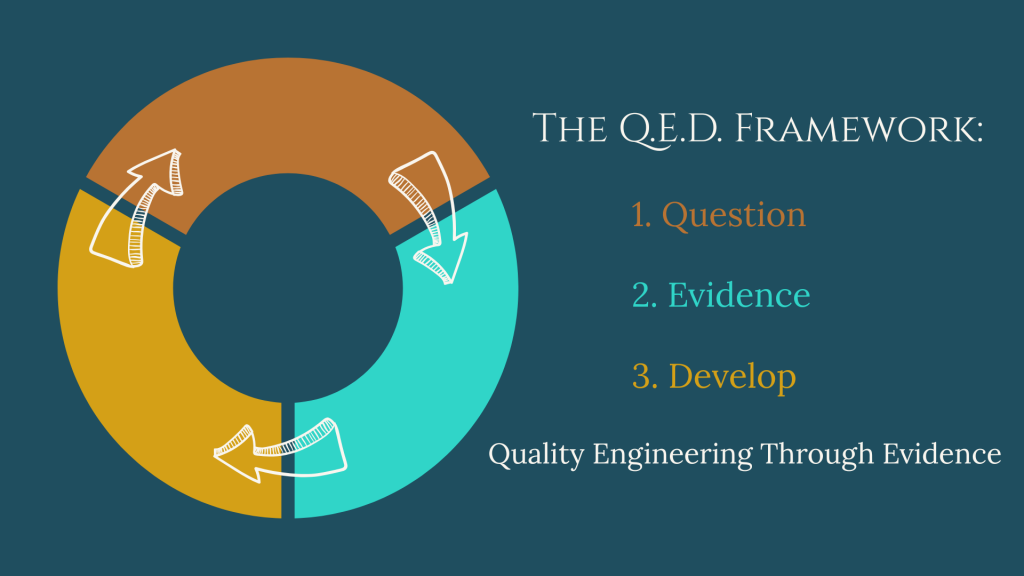The struggle every quality professional knows too well
If you’re responsible for quality in your organisation, this scenario probably sounds painfully familiar:
You’ve identified critical quality issues that need addressing. You’ve meticulously documented the bugs, you’ve raised concerns about technical debt, and you’ve even suggested process improvements that could prevent these problems.
But when you present these findings?
Your bugs get prioritised below new features. Your technical debt concerns are acknowledged but pushed to “someday.” And your process improvement suggestions are seen as “nice to have” rather than essential.
Despite your expertise and commitment to quality, you remain “just the tester” rather than a valued advisor whose recommendations drive meaningful improvements.
It’s frustrating. It’s demoralising. And unfortunately, it’s incredibly common.
Why most testers struggle to influence quality decisions
The hard truth is this: most quality professionals focus on finding and reporting problems rather than demonstrating the value of solving them.
When you present a list of bugs, stakeholders see “more work.” When you raise concerns about technical debt, they hear “delays to features customers are waiting for.” When you suggest process improvements, they calculate “time away from development.”
Without connecting quality issues to business impact, your valuable insights get lost in translation.
But what if there was a better way?
Introducing the Q.E.D. framework
After years of seeing talented quality professionals struggle to drive meaningful improvements, I developed the Q.E.D. framework: Quality-focused experimentation and development.
This framework transforms how quality professionals approach their role, shifting from “finding problems” to “driving valuable solutions” through three straightforward steps:
Question: Define problems worth solving
Instead of presenting a list of bugs or vague quality concerns, identify specific quality problems with clear business impact:
- Not “We have too many bugs,” but “Our checkout flow has a 15% error rate, costing us an estimated £25,000 in lost sales monthly.”
- Not “Our technical debt is growing,” but “Response times have increased by 30% in the last quarter, directly affecting our conversion rates.”
By framing quality issues in business terms, you immediately shift the conversation from “quality for quality’s sake” to “quality as business value.”
Evidence: Create targeted metrics that matter
You can’t improve what you can’t measure, but most quality metrics don’t connect to what stakeholders actually care about.
The Q.E.D. approach focuses on creating 2-3 targeted metrics that directly link quality to business value:
- Customer-impacting defect rate (not just total defects)
- Revenue impact of quality issues (not just bug counts)
- Time saved through quality improvements (not just test coverage)
These metrics transform quality from a cost centre to a value creator in the eyes of stakeholders.
Develop: Run small, fast experiments
Instead of proposing massive quality initiatives that take months to show results, the Q.E.D. framework focuses on small, targeted experiments:
- Design minimally viable solutions to specific problems
- Time-box experiments to 1-2 weeks maximum
- Implement with the smallest possible scope
- Collect metrics that demonstrate clear business value
- Make data-driven decisions to scale, pivot, or abandon
This approach delivers quick wins that build credibility and momentum for larger quality improvements.
Real results from real teams
A UK building society was struggling with integration issues in their online banking system. Authentication failures were occurring in 12% of account information requests, leading to frustrated customers and increased support calls.
The quality team had raised this issue repeatedly, but it was continually deprioritised against new features.
Using the Q.E.D. framework, they:
- Reframed the problem in business terms: “Authentication failures are costing us approximately £20,000 monthly in support costs and a 10% drop in new user retention.”
- Created metrics directly tied to business impact: authentication failure rate, support call volume, and customer retention rates for affected users.
- Ran a two-week experiment implementing targeted fixes for the authentication component only.
The results? Authentication failures dropped from 12% to just 3%. Support calls decreased by 25%. And most importantly, the quality team transformed from “the people who complain about bugs” to “the team that saved us £15,000 per month.”
Master the framework: Join our course
If you’re ready to transform from frustrated tester to respected quality advisor, I’m excited to announce that registration is now open for “Quality engineering through evidence: Mastering the Q.E.D. framework.”
This isn’t theoretical training. It’s an intensely practical, hands-on course where you’ll apply the framework to your actual quality challenges with my guidance.
Over four live sessions in May (8th, 15th, 22nd, and 29th), you’ll learn to:
- Identify quality problems that connect directly to business objectives
- Create metrics that demonstrate clear value to stakeholders
- Design and run experiments that deliver measurable results in weeks
- Position yourself as a trusted advisor rather than “just a tester”
Each session combines targeted instruction with hands-on activities, giving you the tools, templates, and techniques to implement the framework immediately in your organisation.
Limited availability
To ensure everyone receives personal attention and guidance, I’m limiting this cohort to just 20 participants. Based on past courses, I expect these spots to fill quickly.
Ready to transform your approach to quality?
If you’re tired of having your quality concerns ignored and ready to become the quality advisor your team needs, this course is for you.
Secure your spot now → Limited to 20 participants
Questions? Email me at kat @ kato-coaching.com

